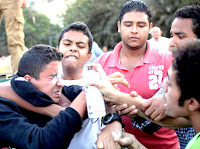Washington Post by Fareed Zakaria In a thorough 2010 study, “The Arab-Israeli Military Balance,”
Anthony Cordesman and Aram Nerguizian document how over the past decade
Israel has outstripped its neighbors in every dimension of warfare. The
authors attribute this to Israel’s “combination of national
expenditures, massive external funding, national industrial capacity and
effective strategy and force planning.” Israel’s military expenditures
in 2009 were about $10 billion, which is three times Egypt’s military
spending and larger than the combined defense expenditures of all its
neighbors — Egypt, Syria, Jordan and Lebanon. (This advantage is helped
by the fact that Israel receives $3 billion in military assistance from
Washington.)
But money doesn’t begin to describe Israel’s real advantages, which
are in the quality and effectiveness of its military, in terms of both
weapons and people. Despite being dwarfed by the Arab population,
Israel’s army plus its high-quality reservists vastly outnumber those of
the Arab nations. Its weapons are far more sophisticated, often a
generation ahead of those used by its adversaries. Israel’s technology
advantage has profound implications on the modern battlefield. [...]
These are the realities of the Middle East today. Israel’s
astonishing economic growth, its technological prowess, its military
preparedness and its tight relationship with the United States have set
it a league apart from its Arab adversaries. Peace between the
Palestinians and Israelis will come only when Israel decides that it
wants to make peace. Wise Israeli politicians, from Ariel Sharon to Ehud
Olmert to Ehud Barak, have wanted to take risks to make that peace
because they have worried about Israel’s future as a Jewish and
democratic state. This is what is in danger, not Israel’s existence.






















